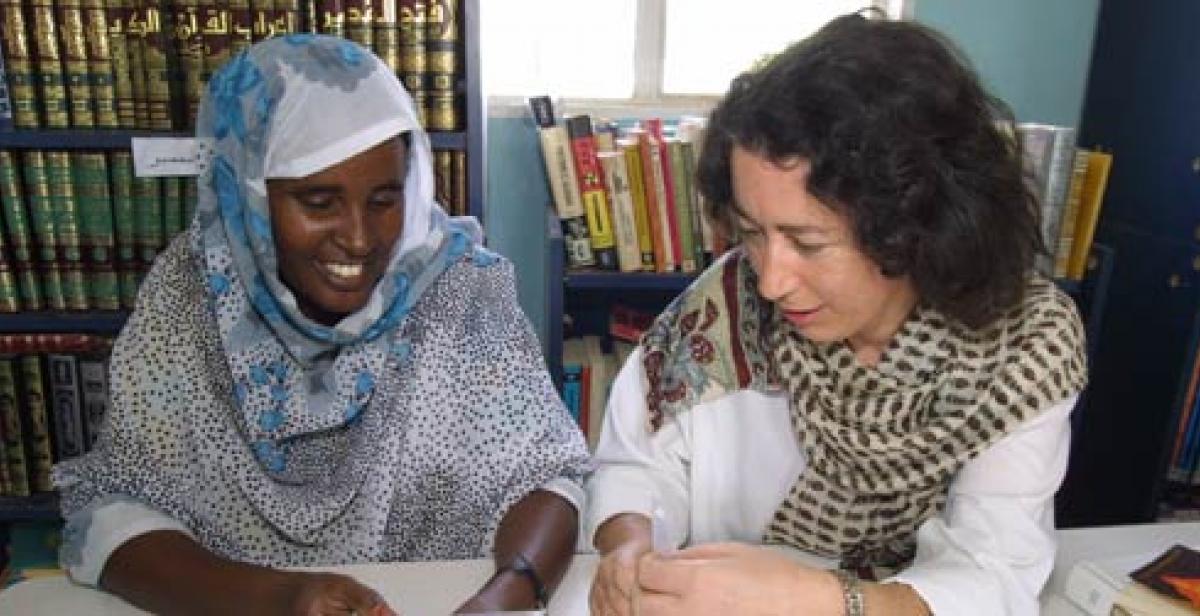What have you done since leaving Progressio and what do you do currently?
Currently working at City of Westminster Libraries and Culture, where I am Reading, Learning and Community Services Manager. I did some temporary project work for Westminster for six months between my two stays in Somaliland, and they invited me back for more when I returned to London again. I am in my current post since January 2006.
Please describe your role and the partner organisation that you worked with as a Progressio development worker
My first and longest stint was as Librarian at Amoud University in Borama in northwest Somaliland, near the Ethiopian border. It was a new university started and run by the local community, funded mainly by overseas remittances. Lecturers were a mixture of Somali academics returned from living abroad, and some international staff from Progressio, UN organisations and US charities. It created a library from restored buildings, attracted large donations of books and local staff to work there, but lacked the expertise to organise the material and develop systems and processes to enable the students to get the most from the library. My task was the do this, to pass on the main principles of information management to the staff, and to train them in maintaining the service.
I also helped set up systems and organise a small public library in Hargeisa (the only one in the country): I trained the manager and staff there (all volunteers) and introduced sustainable services.
In addition, I advised at a second new university, the University of Hargeisa.
While there, I was struck by the fact that in each of these libraries there were only a couple of books on the country itself, its history, culture and people. I resolved to acquire a collection of books on Somaliland/Somalia, in English and Somali, and try to get another period in-country to take them back and set up a library with local material.
What inspired you to become a development worker?
I had been studying International Development at Birkbeck University part-time and was interested in doing something useful in a developing country. Professionally I am a librarian, and at the time had completed over 13 years as Head of the Poetry Library at the South Bank Centre. When I saw the advertisement for librarian in Somaliland, I was immediately struck by how appropriate this was and was delighted when my application was successful.
What struck you most about Progressio’s development worker model/approach?
To be embedded in a partner organisation was a very effective method. As Borama was three hours drive from the Progressio office in Hargeisa, I was very much on my own and relied on local colleagues for company and social life, and had no recourse to an international community. The needs of the partner were the whole focus of my time and energy and this contributed to its success. The transference of skills aspect of the job was really important and again being embedded was a big factor in making this work. When I returned on my second visit (placement?), I was struck by fact that the systems I had originally created were still working well and perfectly managed by the local staff.
What did you enjoy most about your role, and of your experience as a development worker?
I very much enjoyed the company of my Somali colleagues, and seeing the project slowly but definitely taking shape and things falling into place. The support of the Director of Somaliland Progessio, Dr Adan Abokor, was something I valued and I remember him with admiration and respect as one of the best individuals I have ever worked for.
What were some of your main achievements while working as a development worker?
Seeing the training I had given still in use and effective.
Bringing Somaliland-related books and materials into the country in appreciable quantities for the first time, and making them available to the public through a partnership with the International Labour Organisation, in a new Resource Centre in Hargeisa.
Witnessing the fascination of the people, especially the young people, as they read books about their history and culture.
And what were some of the key challenges and lessons learnt?
There were many physical challenges, like getting used to very limited electricity provision, and lack of fruit and vegetables. Otherwise, it wasn’t always easy to be confident one was doing the right thing all the time. Also it was fairly challenging to live in a 100 per cent Muslim country, but it taught me a lot about the universality of the human experience and how alike we all are.
Did this experience change you as a person in any way? If so in what way(s)?
Yes, at the time it did, though probably not in any fundamental way. It is certainly a way to get things into perspective, to test one’s own resilience, and to become more tolerant.
Did your experience as a development worker influence your career/ future direction, and help you to get to where you are today? If so, how?
My work skills were considerably enlarged, particularly with regard to management of people and projects. I think it helped hone my judgment too and mature my approach to work. The community aspect of the organisations there, and also of the NGOs I associated with there still feeds into my work with the City of Westminster in London.
What advice would you give to someone who is thinking of becoming a development worker?
Don’t hesitate to do it, it’s highly unlikely you will regret it. Be flexible and open and ready to take the rough with the smooth.



